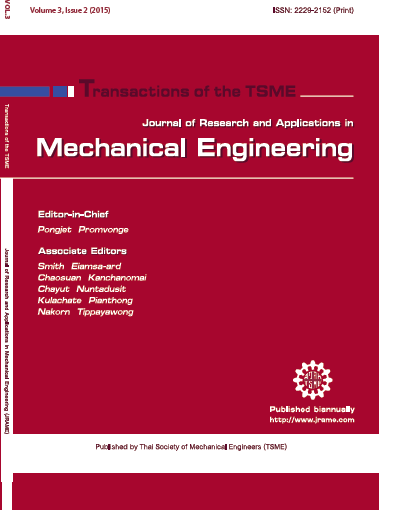A linear - scattering phase function for solving radiative heat transfer equation (RTE)
Main Article Content
Abstract
A scattering-radiation phase function is proposed by the linear equation to be as the optional estimation of the radiative heat transfer equation (RTE) for the case of large diffusely reflective sphere. Simplified mathematics in calculating procedure is a prominent of the present method. Two arbitrary constants of the linear equation including of the slope and the value of the point in which the line cross the y-axis are determined by reproducing hemispherical emittances of isothermal, gray media bounded by a black surface. Thus, the presented equation is in the form of (
) = -1.616 + 1.082. Here, the
is denoted by the quantity of scattering phase function and
is the cosine of scattering angle. To validate the present linear scattering phase function, the conventional method (exact solution) and the solution of Henyey-greenstein approximation are compared. Agreement between the present equation and two mentioned equations is acceptable in the case of pure radiation problem.
Article Details
This work is licensed under a Creative Commons Attribution-NonCommercial-ShareAlike 4.0 International License.
References
[2] Tancrez, M. and Taine, J. Direct identification of absorption and scattering coefficients and phase function of a porous medium by a Monte Carlo technique, International Journal of Heat and Mass Transfer, Vol. 47(2), 2004, pp. 373-383.
[3] Baillis, D. and Sacadura, J.F. Thermal radiation properties of dispersed media: theoretical prediction and experimental characterization, Journal of Quantitative Spectroscopy and Radiative Transfer, Vol. 67(5), 2000, pp. 327-363.
[4] Hsu, P.F. and Howell, J.R. Measurements of thermal conductivity and optical properties of porous partially stabilized zirconia, Experimental Heat Transfer, Vol. 5(4), 1992, pp. 293-313.
[5] Doermann, D. and Sacadura, J.F. Heat transfer in open cell foam insulation, Journal of Heat Transfer, Vol. 118(1), 1996, pp.88-93.
[6] Baillis, D., Raynaud, M. and Sacadura, J.F. Spectral radiative properties of open cell foam insulation, Journal of Thermophys. Heat Transfer, Vol 13(3), 1999, pp. 292-298.
[7] Hendricks, T.J. and Howell, J.R. Absorption/scattering coefficients and scattering phase function in reticulated porous ceramics, Journal of Heat Transfer, Vol. 188(1), 1996, pp. 79-87.
[8] Hendricks, T.J. and Howell, J.R. Inverse radiative analysis to determine spectral radiative properties using the discrete ordinates method, pepper presented in the International Heat Transfer Conference 1994, Brighton, England.
[9] Baillis, D. and Sacadura, J.F. Identification of polyurethane foam radiative properties influence of transmittance measurements number. Journal of Thermophys. Heat Transfer, Vol 16(2), 2002, pp. 200-212.
[10] Kambiz, V. Handbook of Porous Media: Part VI Radiative Transfer in Porous Media, 2000, Marcel Dekker, Inc. Basel. Switzerland.
[11] Ozisik, M.N. Radiative Transfer and Interactions with Conduction and Convection, 1973, John Wiley & Sons. New York.
[12] Modest, M.F. Radiative Heat Transfer, 2nd edition, 2003, Academic Press. San Diego.
[13] Barkstrom, B.R. A finite difference method of solving anisotropic scattering problems. Journal of Quantitative Spectroscopy and Radiative Transfer, Vol. 16(9), 1976, pp.725-739.
[14] Press, W.H., Teukolsky, S.A., Vetterling, W.T. and Flannery, B.P. Numerical Recipes in Fortran 77, 2nd edition, 1992, Cambridge University Press. New York, pp. 347-351.



